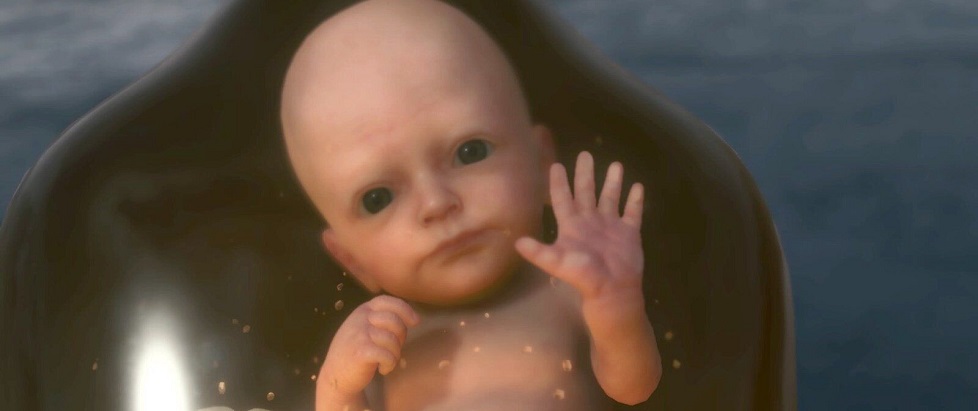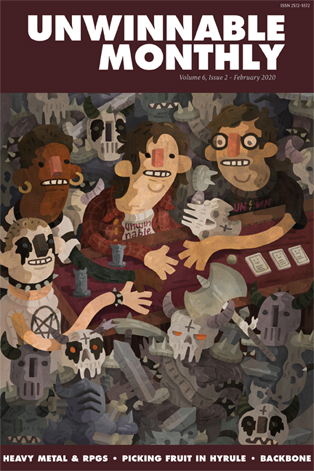
Fantasies of Fatherhood
 This column is a reprint from Unwinnable Monthly #124. If you like what you see, grab the magazine for less than ten dollars, or subscribe and get all future magazines for half price.
This column is a reprint from Unwinnable Monthly #124. If you like what you see, grab the magazine for less than ten dollars, or subscribe and get all future magazines for half price.
———
Finding deeper meaning beneath the virtual surface
———
A few years ago, an outdoorsy friend of mine whose wife was expecting told me that he planned on returning to camping and backpacking as soon as possible once his child was born. He’d simply bundle her up in a bjorn or something and set off, only marginally impeded by the added responsibility of another life. Needless to say, things didn’t exactly work out this way. There have been a few car camping trips since and his steady accrual of new gear has not noticeably slowed, but his fantasy of endlessly ranging the tri-state area’s national parks with a fresh newborn in tow remains firmly stuck within that realm.
Meanwhile, in Hideo Kojima’s Death Stranding, that fantasy lives on. The player controls Sam Porter Bridges, a messenger who hikes around delivering packages, news and hope across a post-apocalyptic territorial United States. With him travels a baby, a fetus, rather, permanently entombed within the technological womb which keeps it alive. The game’s lore defines it as a Bridge Baby, a child still in its fetal stage whose mother has died, somehow allowing it to see the dangerous undead spirits which occupy the zones between the country’s few remaining cities. In this respect, the child is a tool, a piece of machinery that, alongside exoskeletons, harnesses, boots and canteens, completes Bridges’ hiking tech arsenal.
But it also remains a living breathing infant. It coos and gurgles when Bridges plays with it, it screams in fear when monsters threaten it and it calms down and grows attached to Bridges when the player, through him, rocks it softly using the controller’s accelerometer. Like a number of other contemporary games which have infamously earned the label Dad Games, such as The Last of Us (2013) and God of War (2018), Death Stranding has an implicit perspective about fatherhood it reveals through the relationship between its protagonist and his adoptive young charge.

In contrast to past Dad Games, which have traditionally been concerned with the realities of fathering a teenager, or the way adventure can be stymied by a weaker child figure who must be coddled and looked after, Death Stranding seems intent on living out a kind of fathering fantasy, allowing the player to marginally parent less a child than the idea of a child. This child has no corporeality distinct from Bridges so there’s little question of its physical safety or comfort. “Honey please stop motorcycling our baby off cliffs,” an imaginary conversation with the missing mother figure might go. But there’s no one to tell you to care, no one who even thinks of the child as a human being. For the game’s intent, you’ve got little more than a wriggling Tamagotchi with radar saddled to your belly. A script you can punch numbers into, a slider to keep maxed out. When Bridges hits the bunk every night his child sits silently in its high tech cradle, “sleeping” the night away on the other side of the small room, passive until the very moment it needs to be re-activated.
The sense of parental detachment that Death Stranding gives off feels relevant to my own experience, playing this game in my late thirties, childless. Within our friend group, my partner and I are one of the few remaining couples who haven’t had kids; our Instagram stories revolve around our cats’ antics while our friends use theirs to chart the many milestones of their respective offspring. Ordinarily, this doesn’t bother me, but when playing Death Stranding, usually while in my pajamas, in my quiet house, cradling a digital baby through a TV screen, a certain feeling of being apropos can’t be avoided. I get to literally toy with the idea of fatherhood just as Bridges gets to adopt his toy baby, designed to match his convenience above anything else.
In this way, Death Stranding offers me a chance to experiment with fatherhood at its most abstract. It’s not convincingly introspective – it doesn’t ask us what it means to lie to our children like The Last of Us, or what redemption might look like for an emotionally distant father like God of War – instead its ideas are broad and out of focus. It’d be cool to have a baby, to see the world through its eyes. It’d be cool to look after someone, especially since Bridges himself doesn’t feel particularly looked after.
 But fatherhood often gets to be a little abstract, a little experimental. Fatherhood is that wistful gaze you get as you tell your single friends how dramatically having a child has changed your outlook. It’s planning camping trips and photo opportunities. Thinking about all the neat hobbies and nerdy lifelong fascinations you’re going to get to impart. Meanwhile motherhood is over here often getting biologically pulverized by the process of birth, being tied to the child in a way the father literally can’t be. So to get us to this place, Death Stranding has to erase the mother, remake the womb even, and put a man in her place.
But fatherhood often gets to be a little abstract, a little experimental. Fatherhood is that wistful gaze you get as you tell your single friends how dramatically having a child has changed your outlook. It’s planning camping trips and photo opportunities. Thinking about all the neat hobbies and nerdy lifelong fascinations you’re going to get to impart. Meanwhile motherhood is over here often getting biologically pulverized by the process of birth, being tied to the child in a way the father literally can’t be. So to get us to this place, Death Stranding has to erase the mother, remake the womb even, and put a man in her place.
It’s a process that has precedent: beyond their more famous pursuits, alchemists researched ways for the members of their male-only order to become pregnant and give birth. Like drawing gold out of lead, they were convinced that the quickening of life too, could go from the domain of miracles to that of science, and men in turn. We see this in the arc of Cliff Unger, the dead soldier tied to Bridges’ BB, who embraces desperate parenthood over the fridged corpse of his dead wife. Who, even as a ghost, features a glowing red surgery scar that thrums along his torso, where a uterus might have gone. We see this too in how the game punishes its female characters for their ties to motherhood. It’s their suffering, in fact, that seems to be the required bedrock for all of Bridges’ successes.
 There’s Fragile whose main contribution to the story is evidenced in the bombed-out wasteland of the Midwest, caused by her failure and unintentional corruption as a messenger. Where Bridges brings life in the form of hope and connection, Fragile is tricked by the game’s villain, Higgs, into delivering death, a nuclear bomb “cradled in my arms like a child,” into the heart of one of the last remaining cities. She is touched by this death, her body deteriorated by the timefall rain Higgs triggers as she tries to prevent a second detonation. She physically suffers from the destructive consequences of this twisted birth, only for Bridges and his Bridge Baby to sweep in later and clean up her mess.
There’s Fragile whose main contribution to the story is evidenced in the bombed-out wasteland of the Midwest, caused by her failure and unintentional corruption as a messenger. Where Bridges brings life in the form of hope and connection, Fragile is tricked by the game’s villain, Higgs, into delivering death, a nuclear bomb “cradled in my arms like a child,” into the heart of one of the last remaining cities. She is touched by this death, her body deteriorated by the timefall rain Higgs triggers as she tries to prevent a second detonation. She physically suffers from the destructive consequences of this twisted birth, only for Bridges and his Bridge Baby to sweep in later and clean up her mess.
Målingen, or Mama, provides yet another stark counterpoint to Bridges’ freewheeling parental model. Pinned down and trapped for days under the debris from a terrorist’s bomb, Mama loses her unborn child only for it to come back as a Beached Thing, a ghost. She stays rooted to the site of its death, holding its shadow to her breast (an echo of the haunting vision of mother Katherine madly cradling a crow to her bosom to replace her lost child in Robert Eggers’ The Witch) Mama’s experience is one of loss and pain, she sits in her lab, on the literal veil between life and death, unable to let go, haunted, like Fragile, by the past. It is Bridges who must sever her from her child, and ultimately from the world of the living; a man given the right by questionable providence, a father figure envied by the women around him, crushed under the weight of their own motherhood.
Bridges gets to skirt the violence of childbirth, skirts its proximity to death. He literally forces his way back to the surface even when the dead drag him beneath it. His existence is a fantasy played out within a halcyonic vision of post-apocalypse. Utterly isolated within a national parkified nation stripped of its people and its history, Bridges and Death Stranding’s audience get to experience it and their platonic fatherhood purely and without complication. This makes for an interesting experiment, sure, a potentially useful Research and Development program for child-rearing; but it also suffers, in its own way, from the narrow framing that plagues most other Dad Games: the blinders of male privilege, of cliche and groundless romanticism which don’t ultimately tell us as much about the experience of parenting as much as it gives us a window into the way men look at childbirth, and are forced to reckon their various flights of fancy against concrete reality.
———
Yussef Cole is a writer and visual artist from the Bronx, NY. His specialty is graphic design for television but he also enjoys thinking and writing about games.




